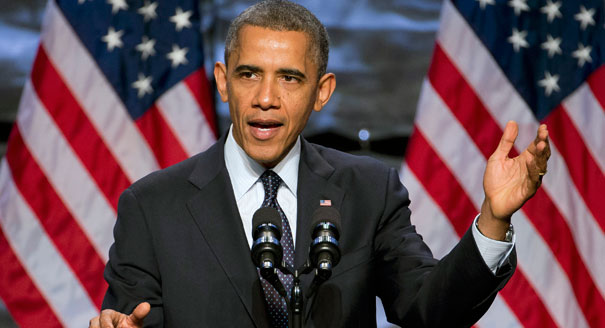Obama Legacy: Handing Trump A broad view of war powers

After eight years as a wartime president, Barack Obama is handing his successor an expansive interpretation of the commander in chief’s authority to wage war around the globe. And that reading has continued to grow even as Obama prepares to pass control to Donald Trump.
In his final weeks in office, Obama has broadened the legal scope of the war on extremism, the White House confirmed Monday, as it acknowledged for the first that the administration now asserts it is legally justified to take on the extremist group al-Shabab in Somalia.
The determination is based on an expanded application of a 9/11-era use of force authorization, a statute Obama has repeatedly leaned on to justify military operations. That rationale has raised concerns about how Trump might use Obama’s precedent to justify other overseas entanglements – without consulting Congress.
Obama’s use of military power, arguing in a detailed report Monday that all operations have been firmly grounded in domestic and international law. White House counsel Neil Eggleston called the report – the first of its kind – a demonstration of how Obama has ensured “that all U.S. national security operations are conducted within a legal and policy framework that is lawful, effective and consistent with our national interests and values.”
Yet the report, which Obama said should be updated annually, also reveals how his administration has relied overwhelmingly on the 2001 authorization, which even Obama acknowledges is outdated.
Though the law’s targets were al-Qaida and the Taliban, a clause in the bill includes “associated forces” of al-Qaida, in Afghanistan or beyond. That clause is now being used as a catch-all for military action in Yemen, Iraq, Syria, Somalia and Libya, the report shows, plus the basing of U.S. troops in other countries.
As for al-Shabab, until recently, the U.S. determined only that its individual leaders were linked to al-Qaida, which limited targeting of those individuals. Now the broader group is included.
Trump has promised a more muscular and militaristic approach to counterterrorism, occasionally using expletives to suggest he’d aggressively bomb ISIS militants, although he has been vague on details.
Deborah Pearlstein, a former White House official and international law professor at Yeshiva University, said it’s likely the next administration will use Obama’s framework as its starting point. “By practice and long history, those opinions tend to stand,” she said.
For Obama, the heavy reliance on 9/11-era authorities is a powerful illustration of how his campaign pledges to construct limits on the president’s war-making powers were confounded by difficulties of dealing with Congress and the pressures of rapidly evolving threats.
Obama came into office aiming to reverse what he argued were the overreaches of his predecessor, George W. Bush. Obama had built a national name opposing the unpopular Iraq War and pledging safeguards to ensure mistakes in that conflict weren’t repeated. In the first days of his presidency, he signed executive orders prohibiting secret CIA “black site” prisons and ending harsh interrogation techniques considered by many to be torture.
Yet Obama quickly discovered that imposing strict constraints made it harder to pursue his preferred approach to counterterrorism.
Wary of major overseas entanglements, he turned increasingly to surgical, stealthy operations like drone strikes that have traditionally operated under a murky legal framework. In a nod to that approach, Obama planned to visit U.S. Special Operations Command headquarters Tuesday in Tampa, Florida, to pay tribute to special ops forces.
Obama’s challenges were exacerbated by extremist groups whose attacks bear little resemblance to traditional state-versus-state warfare. Meanwhile, Congress displayed little appetite for politically controversial votes to authorize new uses of force.
So even when Obama, in 2014, announced the U.S. would target ISIS with airstrikes, he said the 2001 law gave him authority because the group had grown out of al-Qaida. Months later, he asked Congress to pass a new war powers resolution to address ISIS more specifically and replace the outdated law.
Congress never acted. Obama, unbowed, stuck by his legal argument that the 2001 version was still sufficient.
Not everyone agrees.
“If a president can’t convince Congress, as the proxy for the people, of the need to do this such that they will pass an authorization to do it, then we ought not to be using force abroad,” said Scott Roehm, vice president of the Washington-based Constitution Project.
Obama did take other steps to try to strengthen the checks on a president’s military power. In 2013, he notably pulled back from impending U.S. airstrikes in Syria, and instead sought formal approval from Congress that never materialized. And under pressure from civil liberties advocates, he put in place tougher rules for drone strikes, aiming to limit civilian casualties.
“It’s not a legacy that is gonna score a lot of political points. It’s imperfect,” Obama said in a recent interview with New York Magazine. But Americans will have a better idea “their president is going to have to be more accountable than he or she otherwise would have been.”
Some of those details are outlined in the 61-page White House report, the most comprehensive explanation to date of the policies the Obama administration has applied for drone strikes, detention of terrorists and access by humanitarian groups like the International Committee of the Red Cross.
AP